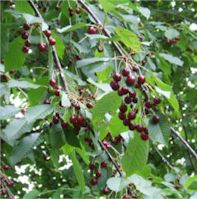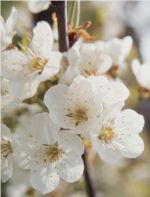 |
 |
The wild Cherry (Cerasus), which occurs of two distinct kinds, has by budding and grafting begotten most of our finest garden fruits of its genus. The name Cerasus was derived from Kerasous, a city of Cappadocia, where the fruit was plentiful. According to Pliny, Cherries were first brought to Rome by Lucullus after his great victory over Mithridates, 89 B.C. The cultivated Cherry disappeared in this country during the Saxon period, and was not re-introduced
until the reign of Henry VIII. The Cerasus sylvestris is a wild Cherry tree rising to the height of thirty or forty feet, and producing innumerable small globose fruits; whilst the Cerasus vulgaris, another wild Cherry, is a mere shrub, called Cerevisier in France, of which the fruit is sour and bitter. Cherry stones have been found in the primitive lake dwellings of Western Switzerland. There is a tradition that Christ gave a Cherry to St. Peter,
admonishing him not to despise little things. In the time of Charles the First, Herrick, the clergyman poet, wrote a simple song, to which our well-known pretty "Cherry Ripe" has been adapted:
"Cherry ripe! ripe! I cry,
Full and fair ones I come, and buy!
If so be you ask me where
They do grow: I answer there
Where my Julia's lips do smile,
There's the land: a cherry isle."
"Cherries on the ryse" (or, on twigs) was well known as a London street cry in the fifteenth century; but these were probably the fruit of the wild Cherry, or Gean tree. In France soup made from Cherries, and taken with bread, is the common sustenance of the wood cutters and charcoal burners of the forest during the [99] winter. The French distil from Cherries a liqueur named Eau de Cerises, or, in German, Kirschwasser; whilst the Italians prepare from a Cherry
called Marusca the liqueur noted as Marasquin. Cherries termed as Mazzards are grown in Devon and Cornwall, A gum exudes from the bark of the Cherry tree which is equal in value to gum arabic. A caravan going from Ethiopia to Egypt, says Husselquist, and a garrison of more than two hundred men during a siege which lasted two months, were kept alive with no other food than this gum, "which they sucked often and slowly." It is known chemically as "cerasin," and
differs from gum acacia in being less soluble.
The leaves of the tree and the kernels of the fruit contain a basis of prussic acid.
The American wild Cherry (Prunus virginiana) yields from its bark a larger quantity of the prussic acid principle, which is sedative to the nervous centers, and also some considerable tannin. As an infusion, or syrup, or vegetable extract, it will allay nervous palpitation of the heart, and will quiet the irritative hectic cough of consumption, whilst tending to ameliorate the impaired digestion. Its preparations can be readily had from our leading druggists, and are
found to be highly useful. A teaspoonful of the syrup, with one or two tablespoonfuls of cold water, is a dose for an adult every three or four hours. The oozing of the gum-tears from the trunk and boughs is due to the operation of a minute parasitic fungus. Helena, in the Midsummer Night's Dream, paints a charming picture of the close affection between Hermia and herself:
"So we grew together
Like to a double Cherry-seeming parted,
But yet a union in partition:
Two lovely berries molded on one stem."



